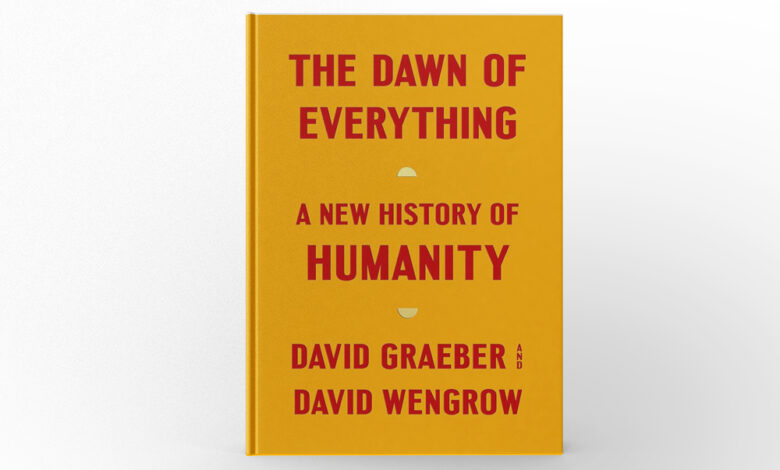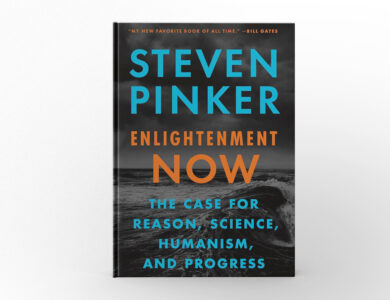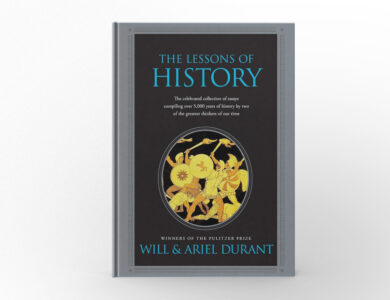The Dawn of Everything by David Graeber & David Wengrow
The Dawn of Everything: A Revolutionary Exploration of Human History by David Graeber and David Wengrow

The Dawn of Everything: A New History of Humanity by David Graeber and David Wengrow is a groundbreaking exploration that challenges conventional narratives about the development of human societies. This ambitious book presents a revolutionary rethinking of early human history, questioning long-held assumptions about the origins of inequality, social structures, and the evolution of civilization. By integrating anthropological insights with historical analysis, Graeber and Wengrow offer a fresh perspective on how human societies have evolved, making The Dawn of Everything an essential read for anyone interested in understanding the complexities of human development.
Author’s Background
David Graeber was a renowned anthropologist and a prominent voice in social theory. Known for his influential works on economic anthropology and his critique of contemporary capitalism, Graeber’s contributions have had a significant impact on how we understand modern and ancient societies. His previous works, including Debt: The First 5,000 Years, showcase his ability to blend rigorous scholarship with accessible writing.
David Wengrow is an esteemed archaeologist whose research focuses on the development of early societies. His expertise in understanding the archaeological evidence of human history complements Graeber’s anthropological insights, providing a comprehensive approach to examining the past. Wengrow’s work has contributed to a deeper understanding of how ancient societies functioned and evolved.
In Depth Summary
Rethinking Human History
The Dawn of Everything begins with a critical examination of traditional historical narratives that have long dominated our understanding of early human societies. Graeber and Wengrow argue that many of these narratives, which often emphasize linear progression and the inevitability of social hierarchies, are fundamentally flawed. Instead, they propose a new framework for understanding human history that highlights the diversity and complexity of early societies.
Key Insights from the Book
- Challenging Conventional Narratives: Graeber and Wengrow challenge the traditional view that human societies naturally evolved from egalitarian bands to hierarchical states. They present evidence suggesting that early human societies were far more varied and adaptive than previously thought, with different groups experimenting with a range of social structures and governance systems.
- The Role of Social Experimentation: One of the central themes in The Dawn of Everything is the idea that early human societies engaged in significant social experimentation. The authors argue that rather than following a predetermined path, these societies actively experimented with different forms of social organization, from egalitarianism to complex hierarchies, in response to their changing environments and internal dynamics.
- Evidence from Archaeology and Anthropology: The book integrates archaeological findings with anthropological theory to provide a comprehensive picture of early human societies. Graeber and Wengrow draw on evidence from various regions, including the Americas, Africa, and Europe, to illustrate the diversity of early social structures and challenge the idea that certain forms of social organization were inevitable.
- The Emergence of Inequality: Graeber and Wengrow also explore the origins of social inequality, arguing that it was not an inevitable outcome of societal development but rather a complex and contingent process. They examine how different societies approached the problem of inequality and how their solutions influenced their subsequent development.
- The Impact of Historical Narratives: The authors discuss how historical narratives shape our understanding of the present and future. By challenging traditional views of human history, The Dawn of Everything invites readers to reconsider their assumptions about social progress and the possibilities for future social arrangements.
Themes and Insights
The Complexity of Human Societies
A major theme in The Dawn of Everything is the complexity and variability of early human societies. Graeber and Wengrow emphasize that human history is not a linear progression from simplicity to complexity but rather a tapestry of diverse experiments in social organization. This perspective challenges the notion of a singular path of development and highlights the innovative ways in which early societies adapted to their environments.
Social Experimentation and Innovation
Another key insight is the role of social experimentation in shaping human history. The authors argue that early societies were not passive recipients of historical forces but active participants in shaping their social structures. This emphasis on experimentation underscores the dynamic nature of human societies and their capacity for creativity and adaptation.
Reevaluating Historical Assumptions
The Dawn of Everything also invites readers to reevaluate their assumptions about the origins of social hierarchies and inequality. By presenting alternative narratives and challenging conventional wisdom, the book encourages a more nuanced understanding of how social structures developed and how they might evolve in the future.
Personal Reflections
The Dawn of Everything offers a profound and thought-provoking exploration of human history. Graeber and Wengrow’s approach to reexamining traditional narratives and highlighting the diversity of early societies provides a refreshing perspective on how we understand the past. The book’s integration of anthropological and archaeological evidence makes it a valuable resource for anyone interested in the complexities of human development and the potential for alternative social arrangements.
Recommendation
The Dawn of Everything: A New History of Humanity is highly recommended for readers interested in anthropology, history, and social theory. Graeber and Wengrow’s innovative approach to understanding human history provides a valuable alternative to traditional narratives and offers new insights into the development of social structures. The book’s thorough research and engaging writing make it an essential read for anyone seeking to understand the complexities of human societies and their evolution.
Impact and Legacy
The Dawn of Everything has had a significant impact on the field of historical and anthropological research. By challenging established narratives and presenting a new framework for understanding human history, Graeber and Wengrow’s work has influenced scholarly discussions and public perceptions of early societies. The book’s emphasis on social experimentation and diversity has contributed to a more nuanced understanding of human development and has opened new avenues for research and inquiry.
Conclusion
David Graeber and David Wengrow’s The Dawn of Everything: A New History of Humanity offers a revolutionary exploration of human history that challenges conventional narratives and provides fresh insights into the development of early societies. Through their thorough research and innovative approach, the authors offer a compelling rethinking of how social structures evolved and how they might continue to evolve in the future. For anyone interested in the complexities of human history and the potential for alternative social arrangements, The Dawn of Everything is an essential and thought-provoking read.




